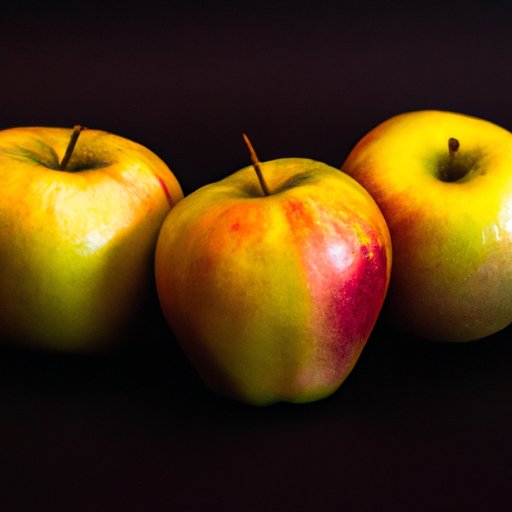
Introduction
There’s an old adage that says, “an apple a day keeps the doctor away.” But does this popular saying hold up when it comes to getting enough Vitamin C? This essential nutrient is vital for our immune system and overall health. In this article, we will explore the nutritional content and health benefits of apples, and answer the question: Does apple have Vitamin C?
An apple a day keeps the doctor away… but does it give us Vitamin C?
The saying “an apple a day keeps the doctor away” is believed to have originated in Wales in the 1860s. It means that consuming an apple every day can prevent illnesses and keep the body healthy. Today, this saying is used to encourage people to adopt a healthy lifestyle that includes eating fruits and vegetables.
Vitamin C is a critical nutrient for our immune system. It helps in the production of white blood cells that fight infections and strengthen our bodies against illnesses. Many people believe that apples are a good source of Vitamin C. But does this hold up to reality?
Exploring the nutritional content of apples: Do they have enough Vitamin C?
Apples are a great source of nutrition. They are high in fiber, antioxidants, and Vitamin C. But how much Vitamin C is in an apple?
A medium-sized apple contains about 8 mg of Vitamin C. This amount makes up about 14% of the recommended daily intake (RDI) of Vitamin C for an adult. While this is not as much as other fruits, such as oranges and strawberries, it’s still a decent amount. Additionally, apples have other essential nutrients like potassium, vitamin K, and vitamin A.
A medium-sized orange, on the other hand, contains about 70 mg of Vitamin C, which is almost a full day’s recommended intake. Other fruits like papaya, kiwi, and strawberries are also excellent sources of Vitamin C. Vegetables like bell peppers, broccoli, and tomatoes are also high in Vitamin C content.
Therefore, while apples do contain Vitamin C, they may not be the best option for those looking to boost their daily intake of this essential nutrient.
Health benefits of apples: Uncovering the Vitamin C content and its impact on our immune system
Apples are good for more than just their Vitamin C content. They also contain fiber, antioxidants, and flavonoids. All of these nutrients have been shown to have health benefits.
Fiber, for example, helps regulate digestion and keeps you fuller for longer. Antioxidants and flavonoids help protect the body from damage caused by free radicals and reduce the risk of cancer, heart disease, and stroke.
When it comes to our immune system, studies have shown that Vitamin C plays a critical role. It supports immune cell function and improves overall immune system health. Apples, with their Vitamin C and other beneficial nutrients, can have a positive impact on our immune system.
Understanding the link between apples and Vitamin C: Are they a reliable source of this essential nutrient?
Vitamin C is essential, but it’s also easy to get from other sources. In fact, there are plenty of foods that are higher in Vitamin C than apples. While apples do have some Vitamin C, they may not be the most reliable source.
If you’re looking to boost your Vitamin C intake, you can consider other fruits like oranges, strawberries, and kiwis, or vegetables like bell peppers, broccoli, and tomatoes. These are all excellent sources of Vitamin C that can supplement your apple intake.
Does your daily apple intake suffice your daily Vitamin C needs? Let’s find out.
The RDI for adults for Vitamin C is 65 to 90 mg per day. A medium-sized apple contains about 8 mg of Vitamin C. Therefore, you would need about 8 to 11 apples a day to meet your daily Vitamin C requirements.
This, of course, is not a realistic or healthy amount. But, adding apples alongside other foods high in Vitamin C can help you meet your daily needs. Eating apples with the skin can also maximize the amount of Vitamin C obtained.
Conclusion
Apples are a tasty and nutritious part of a healthy diet. While they may not be the best source of Vitamin C, they still provide nearly 15% of the RDI. Additionally, apples contain other essential nutrients such as fiber and antioxidants. So it’s worth making them a part of your diet.
To answer the question: Does apple have Vitamin C? The answer is yes. However, there are better food sources with more substantial amounts of Vitamin C. But, apples are still a nutritious and delicious snack that can support our immune system and overall health.




